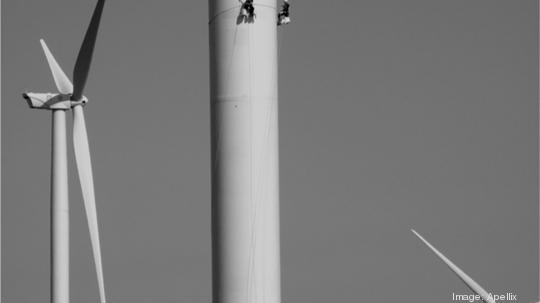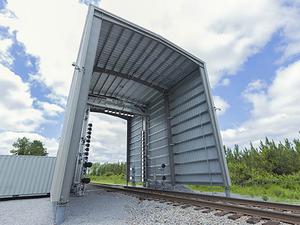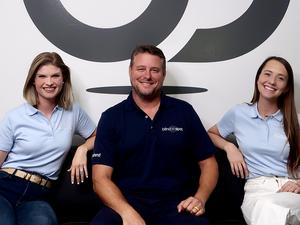
Robert Dahlstrom worked his way through college painting houses.
At the time, it wasn’t so bad. Decades later, though, as a person with his own house and software company, revisiting the chore led him to think there had to be a better way — what Dahlstrom calls “the innovator’s dilemma.”
So he did what any normal person would do — develop a proof of concept on a computer-controlled, spray-painting drone and put out a one-page website on his product. With tubes sending up paint to the drone — which would ordinarily be too heavy for a drone to carry — and energy, Dahlstrom seemed to have come up with something entirely new. Later on, the patents proved that.
When he was inundated with calls shortly thereafter from industrial companies that recognized use cases in his new product for their own operations, he realized he may have hit on something valuable.
This was how Apellix, a Jacksonville-based drone company that Dahlstrom officially founded in 2014, was born. As of 2016, he’s brought on a manager at his software company, BluePrint Data, and stepped into an advisory role there, allowing him to dedicate more time to Apellix.
With various drones now launched, soon to be launched or under development, all performing tasks that would ordinarily be carried out manually by humans high above the ground, Dahlstrom said the goal of Apellix is to help businesses do those tasks quicker, better and more safely.
“We’re pulling people off these buildings — potentially, we’re saving lives,” he said. “It’s 2022. Why do we have people out there holding a probe tip up to a piece of metal to take a measurement when they’re at risk of falling? Let’s put a drone up there.”
As of August 2022, Apellix’s annual revenue is still small — between $500,000 and $1 million. In 2023, though, Dahlstrom expects it to surge to between $5 million and $10 million as a result of the delayed shipping of Apellix’s most sought-after product: the Apellix Powerwash Drone. It's capable of doing exactly what it sounds like — cleaning surfaces — at great heights.
While the Powerwash Drone has officially launched, supply chain issues have pushed out the actual shipping of them until Q4 2022 or Q1 2023. In the meantime, some small, mostly local engineering companies have been using pre-production units.
“We’re going from a start-up to a scale-up,” Dahlstrom said of his company’s trajectory. “This is the second company I’ve started, and when you get to the point where you’re scaling and there’s headaches there, those are good headaches to have."
The Powerwash Drone is a good product to scale with, Dahlstrom explained, as it has use cases far more applicable to most companies than the other products Apellix has had out on the product since 2021, which perform thickness measurements. While very useful to a niche market that needs to, for example, measure the thickness of an asset’s metal to estimate its remaining lifespan, it’s not the big revenue grabber Apellix hopes the Powerwash Drone to be.
The other product Apellix is working on, which is still under development, is actually the product that was part of its origin story: the spray-painting drone.
“There’s a complexity to paint that’s a big barrier to entry,” Dahlstrom said.
There are many factors to that complexity. For one, paint is twice as heavy as water, so it needs to be channeled through “tethers” up to the drone from a source on the ground. It also requires GPS, which can be blocked when the drone goes behind a large object, like a ship’s hull. It also needs magnetic north, which large metal objects throw off, and barometric pressure, which is harder to measure when up close to a large structure.
“It’s why drones don’t fly close to structures — it’s too dangerous,” he said.
Going forward with scaling, Dahlstrom said that while he’ll be looking to do a capital raise at some point in the future, he and his co-founder have been funding the company exclusively with their own money and that of their friends, family and acquaintances.
“You don’t have to be in Silicon Valley to have a successful company, or leave your local area to fundraise,” he said.








